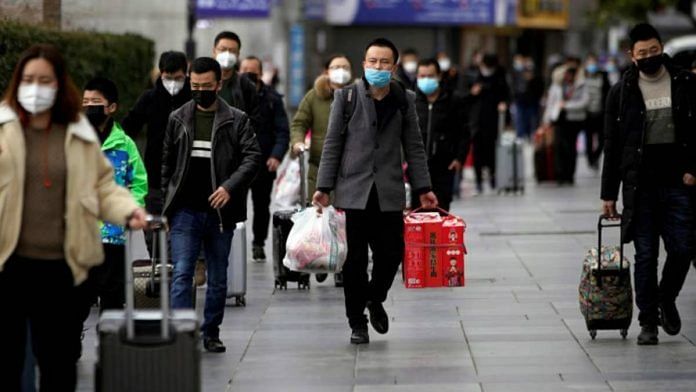New Delhi: Almost half the Covid survivors in Wuhan, the epicentre of the first coronavirus outbreak in China, are still suffering from at least one sequela, commonly known as long Covid, a study has found.
The findings, published in The Lancet on 28 August, indicate a significant improvement from earlier studies that showed 68 per cent of patients reported post-Covid problems six months after infection. The most common problems were found to be muscle weakness/fatigue, sleep problems, and hair loss.
While all these problems manifested within a period of six months to a year, more patients reported depression and shortness of breath (dyspnea) after one year than at six months.
The results came at the end of a year-long study on long Covid from Wuhan — its authors claim it is the largest such study to date.
For the study, the researchers followed the cases of 1,276 Covid patients admitted at the Jin Yin-tan Hospital in Wuhan over a period of one year, making detailed death assessments, first at six months and then at 12 months. All patients had been released between 7 January and 29 May 2020, after recovery.
“We reported that the proportion of patients with at least one sequelae symptom decreased significantly from 68 per cent at 6 months to 49 per cent at 12 months. Fatigue or muscle weakness was the most commonly reported symptom at both visits, but the proportion fell from 52 per cent at 6 months to 20 per cent at 12 months. The proportion of patients with modified British Medical Research Council score of 1 or more and anxiety or depression was slightly higher at 12 months than at 6 months,” the study said.
The British Medical Research Council score measures respiratory distress.
The study also noted that 88 per cent of patients who were employed before being infected had returned to work by the 12-month mark. “For up to 12 months, lung diffusion impairment was observed in about 20-30 per cent of moderately ill patients, and as high as 54 per cent in critically ill patients. 1 year after acute infection, COVID-19 survivors still had lower health status than did non-COVID-19 controls matched for age, sex, and comorbidities,” the researchers said.
“Our data suggest that full recovery after 1 year is not possible for some patients, for whom it will take longer to attain their baseline health state before COVID-19,” the researchers wrote in their conclusions.
Also read: At 16.4 cr doses, SII’s increased Covishield output helps India cross Aug vaccination target
Need for a population-level strategy for long Covid
Calling for population-level strategies to deal with long Covid, the researchers drew upon their earlier work on SARS to analyse the reasons for fatigue or muscle weakness being the most common Covid sequelae.
“The cause and pathogenesis of fatigue and muscle weakness after COVID-19 are unclear, but on the basis of previous evidence in SARS, lung diffusion capacity impairment and some extrapulmonary causes, including viral-induced myositis at initial presentation, cytokine disturbance, muscle wasting and deconditioning, or corticosteroids myopathy, or a combination of these factors, could have contributed to the condition,” they wrote.
Myositis refers to inflammation in the muscles while myopathy refers to any disease that affects muscles. The researchers further said that the increased incidence of depression after infection is “worrying”.
India documents post-Covid complications
In September 2020, India had launched a telephonic survey to document post-Covid complications.
“After acute COVID-19 illness, recovered patients may continue to report a wide variety of signs and symptoms including fatigue, body ache, cough, sore throat, difficulty in breathing, etc. As of now, there is limited evidence of post-COVID sequalae, and further research is required and is being actively pursued. A holistic approach is required for follow-up care and well-being of all post- COVID recovering patients,” read the post-Covid management protocol published by the Union health ministry. It advocates the use of Chyawanprash in Covid recovered patients, among other things.
(Edited by Paramita Ghosh)
Also read: New hurdle in India’s TB fight — states left with machines they can’t use



